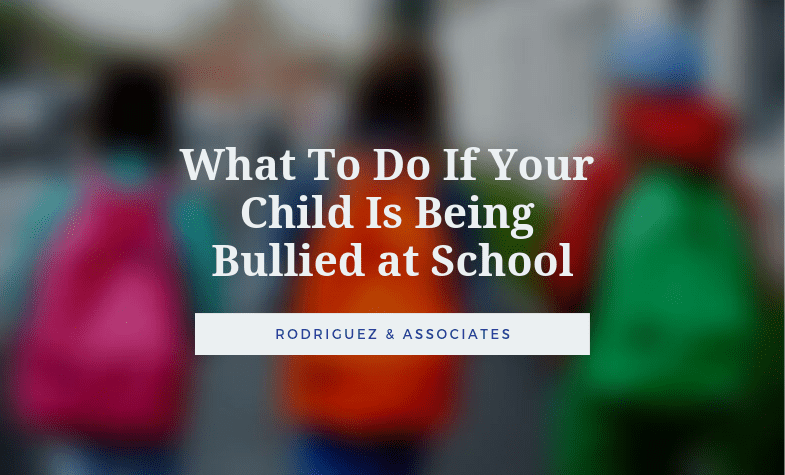It wasn’t so long ago that bullying at school was considered just another part of growing up and something children were meant to work out between themselves. Fortunately, that attitude is changing dramatically, and today more parents, schools, and lawmakers treat bullying as an unacceptable activity that in some cases is even criminal.
Nonetheless, bullying persists, and the consequences can have long-term effects on a person’s mental and physical health long past childhood. In some cases, the repercussions of bullying are fatal: Rodriguez & Associates represented the family of a teenage boy who was bullied so relentlessly it eventually drove him to suicide. In the United States, bullying is also closely linked to school shootings.
Parents can teach and protect their children by gaining a better understanding of what to do when their child is a victim of bullying, whether that means going to teachers or going to law enforcement.
If you believe your child is being bullied at school, consider the following steps:
1. Learn to recognize signs of bullying.
In many cases, your child won’t walk right up to you and say they are being bullied by another student. But certain signs indicate the potential presence of bullying.
Random, unexplained physical injuries, such as scrapes or bruises, could mean violence. A classic sign is your child not wanting to go to school: they may try to avoid it by claiming they are sick. When this starts to happen frequently, you may have a bullying problem on your hands. Other potential indicators include damaged or missing property, failing grades, and your child suddenly wanting to avoid social activities.
While none of these things are exclusive to bullying, any one of them could indicate problems at school and should be investigated thoroughly and immediately.
2. Don’t overreact.
As a parent, your natural inclination might be to head straight to school to confront the bully. Or you may feel the need to voice out loud, in front of your child, the unfairness of the situation and how angry it makes you.
But emotionally charged statements and reactions, however well intended, might actually work against you, as they might make your child feel less safe. For example, you confronting the bully on the school playground could actually lead to further teasing or worse for your child, making them feel even less safe at school than they were before.
Instead, make it a point to listen calmly as your child explains the situation in their own terms. Let them do most of the talking, so they can feel free to express their true feelings and concerns. Try to avoid making any judgements or assumptions, especially about the other child.
3. Talk to your child’s teacher.
It is important to get the teacher involved early in the process, preferably as soon as your child starts talking to you or someone else about being bullied. Set up a time to meet with the teacher and explain the situation. Don’t simply make the assumption that the teacher already knows and simply hasn’t done anything. In many cases, teachers aren’t even aware that their students are being bullied.
Once made aware, though, they must become part of the solution. Follow up with the teacher after your initial conversation to make sure the school is using the resources it should have in place to address bullying. If the situation is still not resolved after getting the teacher involved, you may need to go to the school’s principal.
4. Go to the police.
In some extreme cases, bullying can turn to actual violence or threats of it. When that happens, it’s a crime and it’s time to get law enforcement involved. In light of tragic events that have happened at schools across the U.S. over the years, both schools and police take these threats of violence very seriously.
If taking such drastic measures makes you uncomfortable or you are not sure how to proceed, you can also consult an attorney. A lawyer with experience in handling cases of bullying can counsel you through the situation and help you understand your options as well as when it makes most sense to involve the police or pursue litigation.
Students of all ages have a right to attend school without fear of being harassed or bullied about who they are—their beliefs, appearance, ethnicity, and all the other factors that make up a human being. Rodriguez & Associates is committed to helping parents put an end to bullying and make schools safe, welcoming, open environments for all children to attend. Reach out to us today to discuss your concerns.
